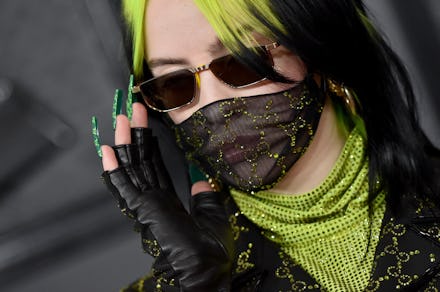Fashion face masks are here, whether we like it or not

Did Billie Eilish know something we didn’t when she hit the red carpet at the 2020 Grammys, dripping in head-to-toe Gucci, including a sheer, double-G embossed face mask? In a few short months, covering your face has morphed from a sartorial statement into a necessary part of getting dressed if you plan to be in public.
Obviously, coronavirus has radically altered how most people feel about wearing a mask. At the onset of the global pandemic four months ago, there was a run on personal protective equipment (PPE), with people hoarding N95 and surgical masks, sterile gloves and other medical supplies frontline workers and caregivers need to stay safe.
When hospitals nationwide announced PPE shortages and governors began pleading for emergency masks, gowns, face shields and ventilators, the fashion industry was quick to answer the call. Christian Siriano was one of the first designers to retool operations, directing his 10 seamstresses in New York to start sewing masks in mid-March, with the goal of producing a few thousand a week.
Manufacturing bonafide PPE is a tricky task, however; there are all sorts of logistics to navigate, from FDA regulations to sourcing medical-grade materials. Far more artists and designers have opted to make masks for civilians. Musicians, forced to postpone tours and gigs, have been upcycling merch into masks, too. New Jersey post-hardcore band Thursday donated their stockpiled t-shirts to grassroots sewing collectives along the East Coast like SewYouCare and FaceMask Warriors. Taking Back Sunday also stepped up to further their efforts.
At the beginning of April, the CDC recommended everyone wear cloth masks in public to slow the spread of the virus. According to a recent poll, a majority of Americans are following the rules. And as states loosen stay-at-home guidelines and begin reopening gathering places like restaurants and salons in coming weeks, mask wearage will be a requirement for patronage.
It’s a real possibility we’ll be covering our noses, mouths and chins in public for much of the next year or more, until a vaccine is developed. And naturally, people are starting to care about the sartorial statement they’re making, fueling the market for fashion masks. The number of companies hawking masks jumped almost 40 percent in the first quarter of 2020 versus the end of 2019, according to digital retail tracking service Edited.
Etsy reported that over the course of a single weekend in early April, buyers searched for face masks an average of nine times per second, more than 2 million searches total. Supply has exploded, too, as the number of mask sellers on the site grew fivefold in late March and early April, to nearly 20,000. Just yesterday, Vogue posted a roundup of 75 stylish cloth masks to buy — many of them on Etsy, and many of them now sold out.
Lots of masks are on offer for modest sums, around $10 or $15 apiece. But stylish facial coverings are hitting the market at price points to suit every income bracket. Collina Strada masks made from deadstock and featuring giant bows are going for $100 apiece. Even Siriano has started dabbling in high-fashion facewear, recently telling WWD he made a “fully encrusted pearl mask because I just needed a break.” (It’s not for sale — though it’s not hard to imagine COVID-19 infiltrating couture, with decorative masks ending up on the catwalk, if fashion shows ever happen again.)
A subscription service for masks has emerged, of course. For $9.99, MaskClub.com will ship you a fresh face covering every month. It was started by Michigan-based licensing firm Trevco, and Licensing International says the company has “opened the licensing floodgates” on masks, hawking more than 2,000 face coverings featuring recognizable superheroes, cartoon characters, logos and patterns. MaskClub.com has a cutesy origin story; the founder’s infant son was terrified of his dad in a mask, so he designed fun ones to make it less scary. Not sure Betty Boop as a pirate is inherently less disturbing than a plain blue mask, but whatever.
Like baseball caps, tote bags or t-shirts, masks are becoming yet another utilitarian garment for people to customize to tout their individuality or further a message. “We haven’t seen anything like this since fidget spinners,” Tim Andrews, president of the Advertising Specialty Institute, a promotional products trade group, told New York magazine’s Intelligencer. “Corporations, sports teams, entertainment, charitable events — I think you’re going to see logos on all sorts of masks.” Don’t be surprised if you see retail workers and delivery drivers wearing company branded masks soon, too.
Wearing a mask is the “good samaritan” thing to do, to protect your community from the virus, which you could unknowingly be carrying and transmitting. But the mask market that’s sprung up in response to coronavirus raises some questions, too. Should you really profit off a global pandemic? At what point do masks crossover from necessary medical supply to status symbol, and how should we feel about that? People have long relied on labels to flaunt their wealth, but paying-through-the-nose for a scrap of fabric and some elastic, just because it’s made by some designer, feels icky no matter how you slice it in these fraught times.
To give back to the community and perhaps save face, lots of mask purveyors have adopted a “buy one, give one” model, where for every mask that’s purchased, one is given to a frontline worker for free. Some are using proceeds to purchase medical-grade PPE for hospital workers. I don’t know how I’ll feel about Disney hawking Frozen-branded masks for kids, theoretically, or some right-winger inevitably manufacturing MAGA masks (despite the president’s coronavirus denialism). But at this point, the right thing for everyone to do is to wear a mask (if you need to be in public at all). It’s a good thing, at least, that there seem to be plenty of cloth masks to choose from.